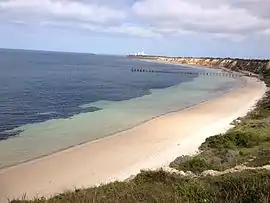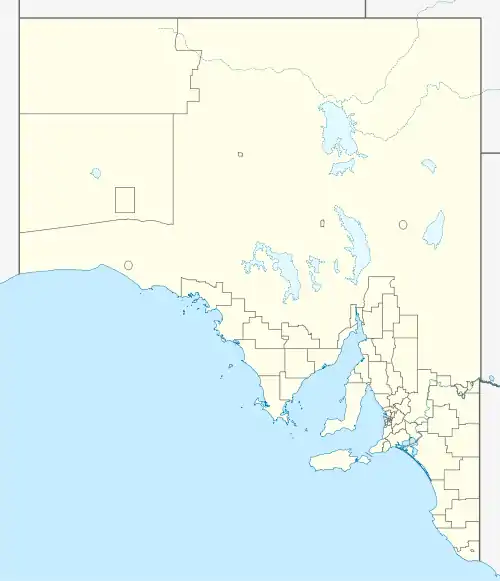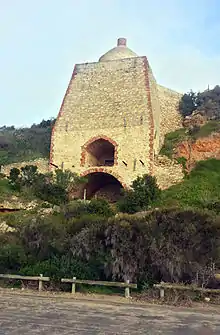Wool Bay, South Australia
Wool Bay (formerly Pickering) is a locality and a former government town in the Australian state of South Australia on the east coast of southern Yorke Peninsula. It is located between Stansbury and Coobowie on Yorke Peninsula, approximately 220 kilometres from Adelaide by road, but only just over 60 km due west across Gulf St Vincent.
| Wool Bay South Australia | |||||||||||||||
|---|---|---|---|---|---|---|---|---|---|---|---|---|---|---|---|
 View of Wool Bay and jetty from the cliff top | |||||||||||||||
 Wool Bay | |||||||||||||||
| Coordinates | 34°59′35″S 137°45′15″E[1] | ||||||||||||||
| Population | 138 (2016 census)[2] | ||||||||||||||
| Established | 24 August 1876 (town) 27 May 1999 (locality)[3][4] | ||||||||||||||
| Postcode(s) | 5575[5] | ||||||||||||||
| Time zone | ACST (UTC+9:30) | ||||||||||||||
| • Summer (DST) | ACST (UTC+10:30) | ||||||||||||||
| Location |
| ||||||||||||||
| LGA(s) | Yorke Peninsula Council[1] | ||||||||||||||
| Region | Yorke and Mid North[1] | ||||||||||||||
| County | Fergusson[1] | ||||||||||||||
| State electorate(s) | Narungga[6] | ||||||||||||||
| Federal Division(s) | Grey[7] | ||||||||||||||
| |||||||||||||||
| |||||||||||||||
| Footnotes | Adjoining localities[1] | ||||||||||||||
Description
The beach of Wool Bay features a permanently moored pontoon which is maintained by the local progress association, several sun shelters and a concrete boat ramp.[9] A number of marine animals inhabit the waters of Wool Bay; dolphins and sting rays can frequently be seen close to shore, and fur seals often feed off the rocky outcrop between the second and third coves past the main bay in the early evening.
History
The town was originally called Pickering when it was established on 24 August 1876.[3] It is on cliffs overlooking a protected bay. In 1882 a jetty was built, initially to roll wool bales out to the ships. The locals came to know the jetty as Wool Bay jetty and by 1940, the name of the town had also changed to Wool Bay.[10] For many years, the town functioned as a wool, grain and lime exporting port.
History of lime burning at Wool Bay

Between 1900 and 1910, six lime kilns were built on the cliffs overlooking the bay. Lime was burnt to create quicklime, an ingredient in mortar and brick-making. The kilns were one of the largest and most modern facilities in the state when they were established by David Miller & Sons, and opened in 1910.[11] The Wool Bay lime kilns closed in the 1960s and most of the kilns and associated infrastructure were demolished in the 1970s.[12] One kiln remains and was listed along with the jetty under the name of Wool Bay Lime Kiln & Jetty on the South Australian Heritage Register on 28 November 1985.[13] Limestone is still mined at Klein Point north of the township of Wool Bay, and shipped from a separate jetty to the Adelaide Brighton Cement facility near Port Adelaide.
Wool Bay jetty
Community lobbying for a jetty commenced in 1879: the people believed that deep water in the bay would provide safer anchorage than other nearby locations. Eventually in 1882 construction of a jetty was undertaken by Frank George. Originally 155 metres long, it provided a depth of 2.1 metres at low tide. When lime burning became an established industry at Wool Bay the jetty was extended by a further 18 metres in anticipation of increased use. During this time, a steamship service dropped off and picked up provisions three times a week. When bulk-handling of grain was introduced at Port Giles in 1970, Wool Bay's importance as a port dwindled.
Today, the jetty at Wool Bay is popular with anglers. It is known for producing good catches of squid and tommy ruff throughout the year while Garfish, mullet and snook and other species can be caught in season. The jetty is also used by recreational scuba divers, drawn by the population of leafy seadragons that inhabit the waters beneath the jetty.
Governance
Wool Bay is located in the federal Division of Grey, the state electoral district of Narungga and the local government area of Yorke Peninsula Council.[7][6][1]
References
- "Search results for 'Wool Bay, LOCB' with the following datasets selected - 'Suburbs and localities', 'Counties', 'Government Towns', 'Local Government Areas', 'SA Government Regions' and 'Gazetteer'". Location SA Map Viewer. South Australian Government. Retrieved 17 January 2019.
- Australian Bureau of Statistics (27 June 2017). "Wool Bay (State Suburb)". 2016 Census QuickStats. Retrieved 17 January 2019.

- Musgrave, A. (24 August 1876). "Untitled proclamation re the Township of Pickering" (PDF). The South Australian Government Gazette. Government of South Australia. p. 1633. Retrieved 17 January 2019.
- Kentish, P.M. (27 May 1999). "GEOGRAPHICAL NAMES ACT 1991 Notice to Assign Boundaries and Names to Places (in the District Council of Yorke Peninsula)" (PDF). The South Australian Government Gazette. Government of South Australia. p. 2696. Retrieved 17 January 2019.
- "Postcode for Wool Bay, South Australia". Postcodes Australia. Retrieved 17 January 2019.
- Narungga (Map). Electoral District Boundaries Commission. 2016. Retrieved 1 March 2018.
- "Federal electoral division of Grey" (PDF). Australian Electoral Commission. Retrieved 24 July 2015.
- "Monthly climate statistics: Summary statistics EDITHBURGH (nearest weather station)". Commonwealth of Australia , Bureau of Meteorology. Retrieved 17 January 2019.
- "Wool Bay". Boat ramp locations. Yorke Peninsula Council. Retrieved 15 January 2019.
- "NEW TOWN NAMES APPROVED". The Chronicle. LXXXIII (4, 728). South Australia. 1 August 1940. p. 13. Retrieved 31 August 2016 – via National Library of Australia.
- "WOOL BAY LIME. NEW KILN ESTABLISHED". The Advertiser. Adelaide. 13 August 1910. Retrieved 1 April 2016.
- Lee, Kel (16 September 2014). "History hidden in seaside cliffs". Weekend Notes. OatLabs. Retrieved 15 January 2019.
- "Wool Bay Lime Kiln & Jetty". SA Heritage Places database search. 28 November 1985. Retrieved 15 January 2019.
| Wikimedia Commons has media related to Wool Bay, South Australia. |